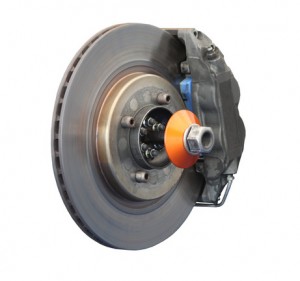 Disc brakes are called disc brakes because of the big metal disc or rotor that spins with the wheel. The brake pads rub against the rotor to slow the vehicle. In technical terms, the motion energy of the moving vehicle is transferred into heat energy by the brakes. The job of the rotor is to absorb that heat and dissipate it into the atmosphere. To do that effectively, the rotor needs a certain amount of mass ( measured by the thickness of the rotor) and a good surface to mate with the brake pads. Let’s talk about those two things.
Disc brakes are called disc brakes because of the big metal disc or rotor that spins with the wheel. The brake pads rub against the rotor to slow the vehicle. In technical terms, the motion energy of the moving vehicle is transferred into heat energy by the brakes. The job of the rotor is to absorb that heat and dissipate it into the atmosphere. To do that effectively, the rotor needs a certain amount of mass ( measured by the thickness of the rotor) and a good surface to mate with the brake pads. Let’s talk about those two things.
First is the thickness. A new rotor is nice and thick and can absorb a lot of heat and dissipate it effectively. Over time, the rotor will wear away slightly. If it wears away too much, there isn’t enough metal to take care of the heat transfer and the vehicle will not brake as well. In fact, each rotor is stamped with the minimum thickness the rotor must have, when the rotor reaches this “discard thickness”, it must be replaced.
The next thing for our consideration is the rotor surface. This isn’t just about the quality of the rotor’s surface, but also about how evenly the brake pad sweeps the rotor. Several things can affect the “swept area” of the rotor. A common problem is a scored or scratched rotor. When brake pads wear past the point in which they should be replaced, metal parts of the brake can meet the rotors and grind grooves into the rotor. Imagine putting new brake pads on a scored brake rotor. The pad would only contact the ridges. This can significantly reduce the contact area and hurt braking performance. When a brake rotor has been scored, it may be able to be resurfaced on a brake lathe which smooths the surface. If the brake rotor isn’t thick enough to be resurfaced, it need to be replaced.
Another common brake rotor problem is something called run out. This is when the rotor is slightly off axis or crooked, so the brake pads don’t come into contact fully or evenly with the rotor. Run out is measured in thousandths of an inch, so we are talking about very small variations that can affect braking. Run out can be caused by a bit of dirt or rust between the brake rotor and the wheel hub, or even by slight variations in the mating surfaces of the brake and hub. Your technician can determine the cause and take the appropriate measures to restore proper brake pad contact.
When run out isn’t detected and corrected early, the rotor itself can wear unevenly leading to thickness variations. This condition is called parallelism because the inboard and outboard surfaces of the rotor are not longer parallel. The variations are small, measured in 10 thousandths of an inch, but they can significantly affect braking performance because of limited brake pad contact. This condition used to be referred to as “warped” rotors. If the rotor is still thick enough, the brake technician will correct the underlying run out problem and resurface the rotor to restore the contact surface, but if the rotor is severely worn it must be replaced.
So, if you hear a grinding sound when you brake, or if your pedal feels unusually soft or hard, bring your vehicle in for an inspection. We can get you the quality parts you need to fix the problem.
